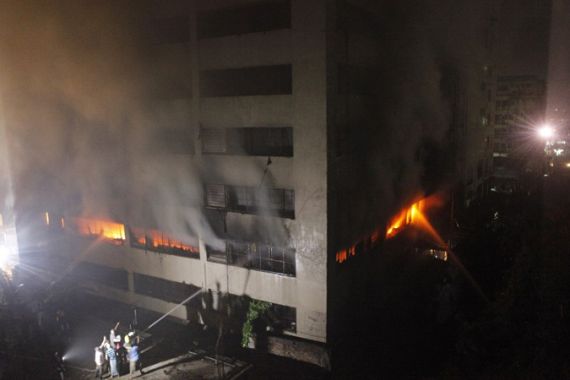Asia’s largest retailer joins safety pact
Fast Retailing joins 85 others in garment-factory safety pledge in response to Bangladesh textile disaster.

Asia’s largest retailer has signed a global safety pact for Bangladesh garment factories in response to a factory-building collapse in April that killed more than 1,100 people.
A spokesman for the Fast Retailing, a Japanese firm that operates the Uniqlo clothing brand, said the company took several months to join the accord because it wanted to thoroughly consider the conditions of the pact.
“Our reason is quite simple – our priority is to work across the industry to improve conditions for the workers in Bangladesh, so we just wanted to join in,” said Aldo Liquori, a Fast Retailing spokesman in Tokyo.
Keep reading
list of 4 itemsHow can we reduce global food insecurity?
Palestinian Prisoner’s Day: How many are still in Israeli detention?
‘Mama we’re dying’: Only able to hear her kids in Gaza in their final days
It's important for consumers to be aware of where their clothes are coming from and to be aware of the supply chain.
Fast Retailing did not have a presence in the manufacturing factory that collapsed on April 24, but the company said it has also completed an investigation of its subcontractors’ factories in Bangladesh.
The collapse of Rana Plaza complex, located in the suburbs of the Bangladeshi capital, was the country’s worst-ever industrial disaster.
It was the latest in a string of deadly accidents to hit the textile industry which forms 80 percent of the country’s exports. In November 2012, a factory fire killed 111 garment workers.
A total of 86 companies from 20 countries have signed on to the Accord on Fire and Building Safety in Bangladesh, including US-based companies Abercrombie & Fitch, American Eagle, PV, Scoop NYC/Zac Posen and Sean Jean Apparel.
But several major US companies, such as Wal-Mart, Target and Gap, among others, have opted instead to form their own group, called The Alliance for Bangladesh Worker Safety.
Lacking teeth
Critics of the alternate plan say it lacks the teeth of the Accord pact, which makes the companies legally responsible in their home countries for financing factory upgrades to bring them up to code with safety regulations.
“We see this North American programme as being really just a facelift of voluntary corporate-controlled monitoring programmes that have, as we’ve seen, resulted in hundreds of workers dying in the Bangladesh industry,” said Liana Foxvog, the director of organising and communications at the International Labor Rights Forum.
In an email, Wal-Mart spokesman Kevin Gardner said the company has taken “a number of actions that meet or exceed other factory safety proposals,” and said Wal-Mart looks forward to working together with the Accord to make progress on worker safety.
Target spokeswoman Jessica Deede said the retailer is “committed to this industry-wide solution to improve safety for workers in Bangladesh garment factories.”
Requests for comment from Gap were not returned.
While all the focus is on worker safety in Bangladesh factories, neither the global Accord nor the alternate Alliance have focused on provisions for factories in other countries.
“The problem does extend beyond Bangladesh,” Foxvog said, highlighting the importance of the consumer in making sure that all garment factories are safe.
“It’s important for consumers to be aware of where their clothes are coming from and to be aware of the supply chain. We can’t just change the world through our shopping habits, we have to get involved.”